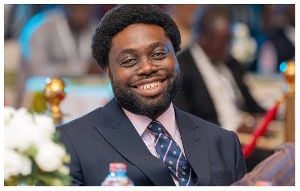In the politically charged landscape of Ghana, the recent launch of “Operation Recover All Loot” (ORAL) by the National Democratic Congress (NDC) has sparked a heated debate, with accusations of political maneuvering and counter-accusations of shielding corruption. Kow Essuman, legal counsel for former President Nana Addo Dankwa Akufo-Addo, has emerged as a prominent critic of the initiative, drawing parallels between ORAL and what he considers a failed precedent set by the NDC in 2009. He specifically points to a legal challenge mounted by NDC members Samuel Okudzeto Ablakwa and Dr. Edward Omane Boamah against the late Jake Obetsebi-Lamptey regarding the acquisition of public land. Essuman highlights the Supreme Court’s 2012 dismissal of the case due to a lack of substantial evidence, arguing that Ablakwa, now leading ORAL, is repeating past mistakes by pursuing similar claims without presenting new and compelling evidence.
The core of Essuman’s argument hinges on the principle of due process and the necessity of presenting concrete evidence to substantiate allegations of wrongdoing. He contends that Ablakwa’s participation in ORAL, given his involvement in the unsuccessful 2009 lawsuit, raises concerns about the initiative’s genuine commitment to fighting corruption. Essuman’s critique implies that ORAL might be driven more by political expediency than a sincere desire to recover misappropriated state assets. He challenges Ablakwa to produce clear evidence of impropriety or illegality, implying that without such evidence, the claims made under the banner of ORAL amount to nothing more than “mere political rhetoric,” designed to score political points rather than achieve genuine accountability.
The 2009 case cited by Essuman serves as the backdrop for his critique of ORAL. In that instance, Ablakwa and Boamah challenged Obetsebi-Lamptey’s acquisition of public land, alleging impropriety. However, the Supreme Court ultimately ruled against them, concluding that they had failed to provide sufficient evidence to support their claims. The court’s decision emphasized the need for concrete proof of “arbitrariness, bias, prejudice, capriciousness and personal dislike or breach of due process of the law.” Essuman argues that Ablakwa’s current actions within ORAL mirror this previous unsuccessful attempt, suggesting a pattern of politically motivated accusations lacking a solid evidentiary foundation.
ORAL, a central plank of President-elect John Dramani Mahama’s anti-corruption platform, was launched in December 2024 with the stated aim of recovering misappropriated state resources and promoting good governance. The initiative is spearheaded by a team chaired by Samuel Okudzeto Ablakwa and includes prominent figures such as former Auditor-General Daniel Domelevo, retired Police Commissioner COP Nathaniel Kofi Boakye, private legal practitioner Martin Kpebu, and investigative journalist Raymond Archer. The team’s composition reflects a diverse range of expertise, seemingly aiming to ensure a comprehensive and robust approach to investigating and recovering allegedly misappropriated funds. However, Essuman’s criticisms cast a shadow over the initiative, raising questions about its objectivity and potential for success.
The clash between Essuman and the proponents of ORAL underscores the deep political divisions within Ghana and the inherent challenges in pursuing anti-corruption efforts. Essuman’s emphasis on the need for concrete evidence reflects a legal perspective that prioritizes due process and avoids politically motivated accusations. On the other hand, the NDC’s launch of ORAL can be interpreted as a response to public concerns about corruption and a commitment to holding individuals accountable for alleged wrongdoing. The success of ORAL will likely depend on the team’s ability to present compelling evidence to support its claims and navigate the complex political terrain.
Ultimately, the debate surrounding ORAL highlights the crucial importance of balancing the pursuit of justice and accountability with the protection of individual rights and due process. The initiative’s effectiveness will be judged not only by the amount of allegedly misappropriated funds recovered but also by the adherence to legal principles and the avoidance of politically motivated prosecutions. The coming months will likely reveal whether ORAL proves to be a genuine effort to combat corruption or, as Essuman suggests, a politically charged exercise in rhetoric and recrimination.


